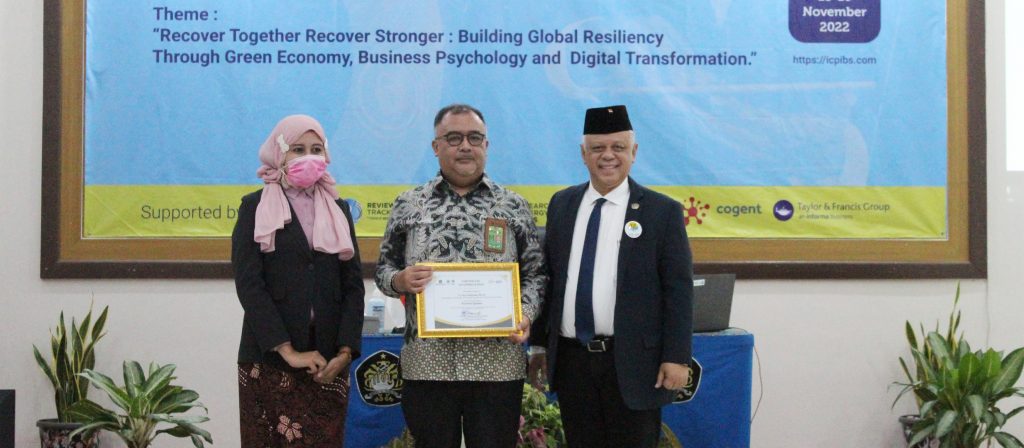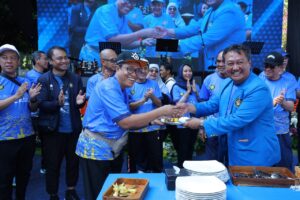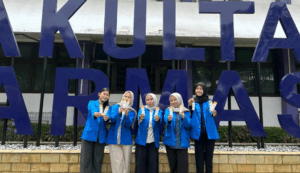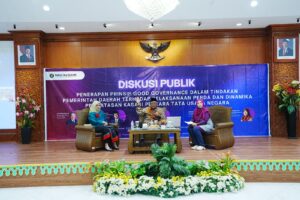
One of the important activities of a researcher is to acquire and share knowledge. Therefore, the dissemination of research results needs to be carried out to carry out research activities. Some academic institutions still insist that the conference be held because it is the responsibility of the university as well as the world research community to disseminate research. The Faculty of Psychology, University of Pancasila has a vision of being the best faculty based on Pancasila values and having Business Psychology as a unique characteristic, in collaboration with the Research Synergy Foundation (RSF) has successfully organized the International Conference on Psychology and Interdisciplinary Behavior Studies (ICP-IBS) on 15- November 16, 2022. The theme of this year's conference is "Recover Together Recover Stronger: Building Global Resiliency Through Green Economy, Business Psychology and Digital Transformation." This activity opens opportunities for researchers, lecturers, students, and academics from around the world to participate, thus enriching the world of research in psychology and behavioral science.
By taking advantage of developments in technology and information, this conference was successfully held virtually through the ZOOM platform with keynote speakers, season chairs, presenters and participants from 19 countries namely Indonesia, England, Switzerland, Austria, Malaysia, Philippines, Pakistan, Nigeria, Thailand, India , Afghanistan, Iraq, Ukraine, Sierra Lone, Egypt, Tanzania, Zambia, Ethiopia and Morocco. With the number of offline participants consisting of 100 participants and 400 participants through online. This conference is supported by various global organizations such as Scholarvein, Reviewer Track, Research Synergy Institute, F1000research, Cogent OA, and Taylor & Francis Group. The major themes of this conference are related to psychology, behavior, and organization. With these 3 (three) major themes, this conference is considered interdisciplinary, thus enriching the presentations and scientific discussions in it. Participants who registered and attended the conference came from 19 countries: Indonesia, Philippines, Switzerland, Malaysia, Austria, United Kingdom, Pakistan, Taiwan, Ukraine, Thailand, Nigeria, India, Ethiopia, Afghanistan, Morocco, Iraq, Sierra Leone, Tanzania, Uganda .
The aim of the 2022 International Conference on Psychology and Interdisciplinary Behavioral Studies (ICP-IBS) is to become a global forum that contributes ideas to understand and improve the management of global issues in the fields of psychology, behavioral studies, digital transformation, and other related topics. , as well as increasing the productivity of cooperation in the fields of education, research, and community service. This conference was held for 2 (two) consecutive days. On the first day, the conference was officially opened by Dr. Silverius Y Soeharso, MM., M.Psi, Psychologist as Chair of the ICP-IBS conference as well as Dean of the Faculty of Psychology, Pancasila University. Then continued by SpeechProf. Dr. Edie Toet Hendratno, SH., M.Sc., FCBArb as Chancellor of Pancasila University. Before the group photo session at the start of the event, Dr. Hendrati Dwi Mulyaningsih, also gave a brief but thorough explanation about the Research Synergy Foundation as a global research ecosystem that has existed since 2017 and is supported by 20 thousands of members who have participated in its programs and come from various countries around the world. With the Global Research Ecosystem that has been initiated by the Research Synergy Foundation, it is hoped that it will open up a lot of access and also opportunities for researchers, lecturers, students, academics, and practitioners to be able to improve the quality and quantity of their scientific publications on an international scale.
The conference with the theme "Recover Together Recover Stronger: Building Global Resiliency Through Green Economy, Business Psychology and Digital Transformation" also presented several invited speakers including Prof. Dr. Ir. Siti Nurbaya Bakar, M.Sc. as Keynote Speaker who served as Minister at the Ministry of Environment and Forestry of the Republic of Indonesia, represented by Mr. Ir. Ary Sudiarto, Head of the Indonesian Ministry of Environment and Forestry's Instrument Standardization Agency who presented topics on Climate Changes, Carbon Trading, Folu Net Sink, and Nationally Determined Contribution, Dr. – Phil. Hora Tjitra as chairman and Co-Founder of Insight Web Academy Jakarta, Indonesia, who delivered topics related to Cross-Cultural Psychology, Prof. Dr. Stefan Kammhuber who is Head of Institute for Communication and Intercultural Competence from Eastern Switzerland University of Applied Sciences. He delivered material on the topic: When Organizational Cultures Collide – The Psychology of National Mergers from an Intercultural Perspective, Assistant Prof. Dr. Crendy Tan Yen Teng from the Department of Psychology, UCSI University, Malaysia, who presented the topic "Is Technology a Tool or We are the tool of Technology?", Prof. Dr. Severin Hornung, PD, PhD, MSc, BEng from the Institute of Psychology of the University of Innsbruck, Austria. He presented the topic material entitled: Building Social Resilience Beyond Neoliberal Ideology: The Emerging Movement for a Critical Future of Work and Organizational Psychology”. Dr. Stephen Benton, B.Sc., Ph.D., MIOA, C.Sci., C.Psychol from BPsy Ltd., United Kingdom who presented the topic "Business Psychology: A Template for Strategic Competence."
Various topics of discussion in this conference are expected to be of particular interest to researchers. International conference activities not only provide opportunities to share ideas and research but also provide opportunities to build networks. Ultimately, a research community that collaborates and cooperates in the future is formed. This activity is a form of commitment from the Faculty of Psychology, University of Pancasila to continue to improve the quality of research, educational development, and efforts to advance human resources so that they have global competitiveness and competence. This kind of scientific meeting is expected to be able to have a positive impact on all related parties, also increase the productivity of human resources, build and strengthen scientific collaboration, and promote contributions and innovations in various fields of science to a wide audience.




